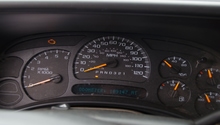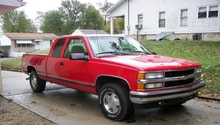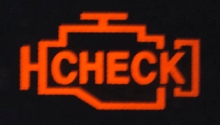Chevrolet Silverado: Warning Lights
No driver wants to see a warning light on the dash. However, adhering to your warning lights when they appear on the dash could extend the life of your Chevy Silverado.
This article applies to the Chevrolet Silverado GMT800, GMT900, and K2XX (1999-Present).
The warning lights on your dashboard provide important information about the health of your Chevy Silverado. If you don't know how to identify the warning lights on your dashboard, or decipher their meaning once you do, you won't know how to respond in the event of an emergency or recurring problem. Problems such as faulty brakes, low oil or tire pressure, a failing charging system, or a defective anti-lock braking system could be identified by familiarizing yourself with the warning lights. Using the following DIY guide, you can learn how to read the warning lights on your dashboard and respond to the problem with confidence, knowing you are fully prepared to speak with your local mechanic about a possible solution.
Component Breakdown
Air Bag Warning Light
The air bag warning light is easy to identify (see Figure 1). If the warning light appears on your dashboard, head to your local GM dealership. One of your vehicle's air bags is faulty and in need of immediate service. While the problem could also be attributed to a faulty sensor, this is one warning light you don't want to second guess.

ABS (Anti-Lock Brake System)
If the warning "ABS" appears on your dashboard, contact your dealer immediately. Avoid attempting to diagnose or repair your braking system on your own. Your anti-lock braking system helps you to maintain control of your vehicle, regardless of your braking activity. If the system becomes faulty, you will need to pull over and have your vehicle towed to your local mechanic. Do not drive with this warning light on!

Trouble Codes
The more sure-fire way to determine the health of your Silverado is using an On-Board Diagnostics scanner (OBD). Available at prices ranging from $75 to $1,000, this small hand-held device reads the trouble codes stored in your vehicle, and then reads them back to you. Trouble codes can identify everything from a faulty parking sensor to poor engine performance and low tire pressure.

Scheduled Maintenance
The best way to ensure the warning lights on your dashboard stay off is to follow your general maintenance schedule to the letter. This means having your engine oil and filters replaced every 7,000 miles, as well as your tires rotated every 3,000 miles. Here are some other general maintenance work you'll want to have done:
- Set up an appointment to have your local GM dealer or mechanic inspect the major systems of your Silverado after 15,000 miles. This should include your braking system and steering system, which, in addition to requiring new fluids, will need to be inspected for wear. You should have another 22,500 miles of travel before your brake system actually needs to be replaced, if at all.
- Replace fuel filter and cabin air filter after 25,000 miles.
- Once you reach the 45,000-miles mark, head back to your local GM dealership or mechanic for another complete inspection of your truck.
- Continue to replace your fluids regularly. For example, you would need to replace your automatic transmission fluid and filter after 52,500 miles, as well as your clutch fluid after 67,500 miles.
- Your next service appointment should be at 75,000 miles.
Common Questions
If My Check Engine Light Appears On My Dashboard, Should I Pull Over?
If your check engine light begins flashing while you're driving, it is strongly recommended that you pull over and have your vehicle towed to your local mechanic. You risk damaging your engine by continuing to drive with the check engine light on. If the light flickers intermittently or is steady, it is recommended seeing a mechanic right away.
What Happens if I Fail to Change My Engine Oil?
Failing to change your engine oil now could spell trouble for the health of your engine later on. That's why it is recommended replacing your engine oil every 7,000 miles. If your engine oil pressure warning light appears on your dashboard, pop the hood and check your dipstick to verify you are, indeed, suffering from low engine oil. Be on the lookout for oil leaks, which are best characterized by greasy stains around your engine and oil dripping on the ground. Make a service appointment right away.
My Truck Frequently Overheats. Does That Mean It's About to Clunk Out?
An overheating vehicle could mean many things, including a low coolant level or a leak in the cooling system. If you're driving and your truck shows signs of overheating, turn off the air conditioner and immediately lower your windows. Ease up on the brake to avoid revving the engine until you stop the vehicle in a safe location, and check for signs of damage. Have a professional inspect your truck, or complete the necessary repairs on your own (if you feel comfortable working under the hood of your truck).
Signs of an overheating vehicle:
- Warning light
- Steam or smoke
- Puddle of coolant
- Cold air blowing from the heater
- Bubbling noise
Common Issues
Check Engine Light Appears Intermittently
Check your diagnostics. The issue could be as "simple" as having low engine oil or a dirty filter; however, if left uncorrected, these simple repairs could lead to serious engine damage, a reduction in fuel economy, and mechanical noises under the hood.
Brake Light Flashes
You will definitely want to check your trouble codes, and have your vehicle serviced right away. The issue could be any number of problems, including a bad brake hose, leaky disc brake caliper, low brake fluid, or a bad sensor.
Noisy Front Brakes
Your brake pads could be worn down or your anti-lock brake system could be failing. Either way, set up an appointment to have your truck serviced by a licensed automotive professional, unless you have expertise in this area.
Related Discussions
- Help, Warning Lights Coming On - ChevroletForum.com
- Brake Warning Light Flashing - ChevroletForum.com
- Service Stability Service Light On - ChevroletForum.com






